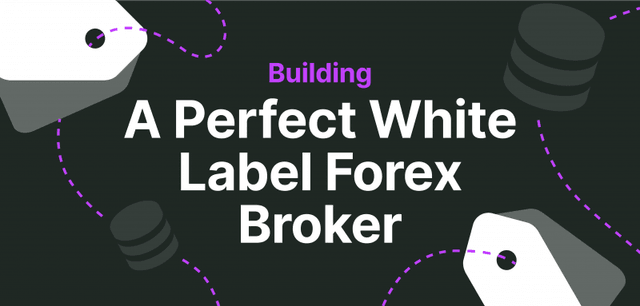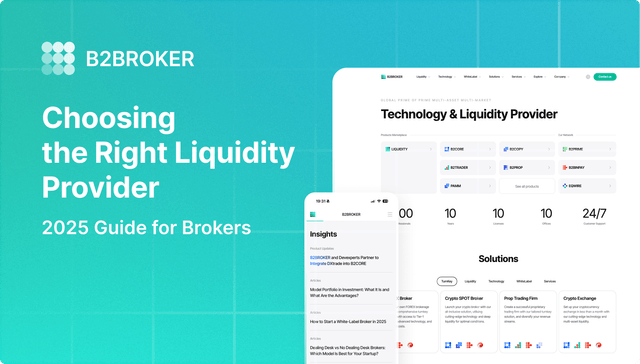White Label vs Outsourcing vs Custom Development vs Source Code

The financial services industry has developed massively over the years, with the introduction of digital platforms and online trading facilitating the access of more service providers to offer different features and technologies to an increasing number of traders.
The industry is becoming more competitive for newly launched startups and businesses, requiring careful planning and elite strategies before entering the market. Nevertheless, there is a massive money pool to be shared, and you can grow your wealth substantially by offering the most demanded services.
Therefore, you must carefully plan your approach, range of services, and costs before entering the market. This article will explain four ways to venture into the thriving financial industry: white label vs outsourcing vs custom development vs source code.
Key Takeaways
- White labels are pre-built platforms that you can customise according to your needs and deploy quickly.
- Outsourcing entails delegating the entire platform development process to a third party because your team lacks programming skills or experience.
- Custom software and source code development involves building the solution from scratch, which can be expensive but offers maximum customisation freedom.
- Acquiring a white label solution enables you to enter the market faster than outsourcing or custom development.
Launching a Business in The Financial Market
The financial trading market is growing rapidly, presenting huge opportunities for businesses and operators to capitalise on the significant money pools. The US securities brokerage market is estimated at almost $200 billion in 2024 and is expected to grow at a 4.23% CAGR rate, reaching over $240 billion in 2029.
Brokers are bound to have more opportunities in this space, with a rapidly growing discount brokerage market estimated at $24 billion in 2024. This trend is expected to continue thriving at a 6.3% CAGR rate and can grow to $33 billion by 2029.
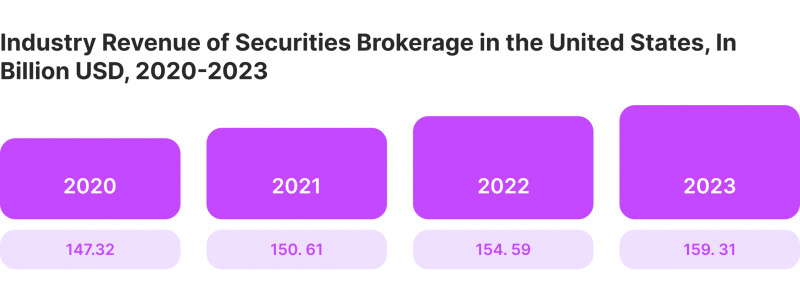
With the industry growing and more revenue poured into the market pool, you can earn your share and capitalise on this growth by launching your brokerage firm. Here are four ways to make an entry.
White Label Meaning
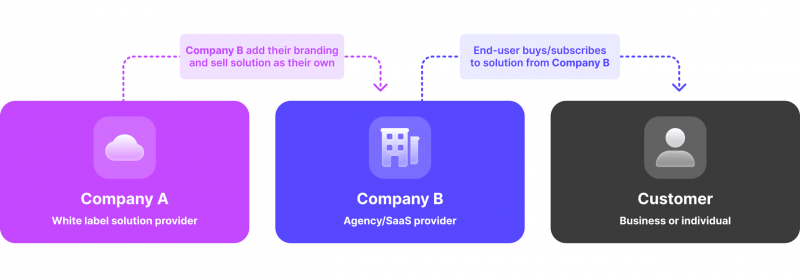
White labelling refers to acquiring a pre-built solution that integrates a brokerage firm’s core functions. You can customise the solution by selecting the features you want and your customers’ requirements. You can also extend the functionality of the white label software by integrating more services and systems that boost your platform’s usability and performance.
White label services are developed by technology providers who use their experience and resources to design and program various templates that suit businesses in different industries. You can deploy a ready-to-use system, rebrand it with your company name, and launch your brokerage firm.
In 2020, the white label and private label industry size was estimated at $99 billion, which is expected to reach $155 billion by 2028, with a compound annual growth rate of 5.5% between 2021 and 2028.
How Much Does a White Label Solution Cost?
The white label provider often charges a fixed fee for acquiring the system and other recurring maintenance and administrative costs. The starting cost depends on the technical specifications and features you choose to apply, but you can estimate that you will pay between $10,000 and $50,000 for your white-label brokerage platform.
Ongoing costs include in-house technicians and developers; you only need a handful of them to adjust the solution to your preferences.
White label solutions save you the time and money required to develop the trading software and the whole ecosystem from scratch and let you focus on advertising your venture.
Time to Market
White labelling is an excellent way to reduce your time to market. One of the main challenges for new businesses is the time required to develop a trading system, payment gateway and other supporting services.
White labels are easier to acquire and deploy, allowing you to capitalise on current market opportunities more efficiently.
Security
The white label partner embeds the software with primary security layers. However, thanks to the flexibility, you can integrate more security options and protocols to safeguard your funds and investors’ money.
You can integrate KYC verification tools to conduct background checks on newly registered users and a cloud computing service to minimise the risk of on-premise anomalies and use highly advanced hosting and developing environments.
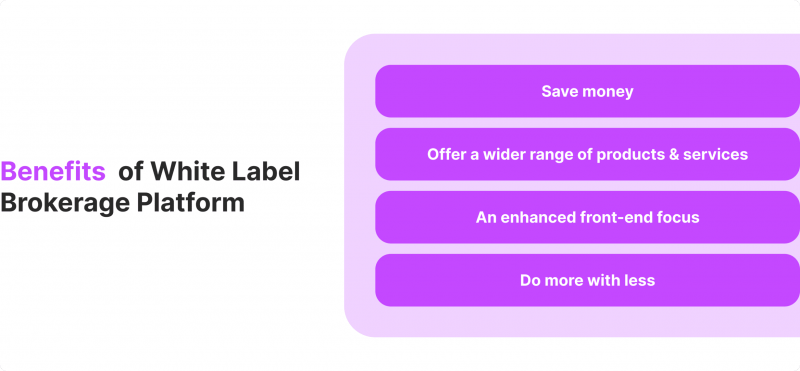
Customisation and Integration Tools
White labels are developed with flexibility at their core. The solution comes with built-in features. However, you can customise it to suit your business. From the get-go, you can pick and choose the features and functionalities you want to offer your customers.
Additionally, you can integrate more services to improve your operations, such as digital wallet connectivity, crypto payment gateways, liquidity bridges, trading software, guided onboarding and more.
Deploying new integrations can take some time, depending on the task complexity and the provider’s workload.
Do you Own The white Label Product?
White labels are pre-programmed blank solutions that you can acquire to serve your objectives, add your logos and redesign with your brand’s names.
Choose a white label partnership that enables you to rebrand the platform based on your requirements, which helps your digital marketing campaign promote your name and use your logo for promotional purposes.
Outsourcing: Is It Better Than White Labelling?
Outsourcing is a common hiring practice where one company delegates the complete task fulfilment to another party, which is usually located in another country or region. Outsourcing usually comes with cost-saving benefits, such as locations with high average wages hiring services from countries with low labour costs.
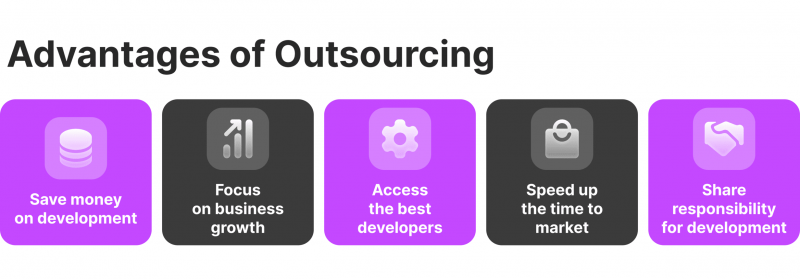
When it comes to developing a brokerage platform, outsourcing refers to delegating the whole development, integration, maintenance and improvement to a third-party company. The provider often has a skilled team with advanced technical experience to program and develop the software that suits your requirements.
Have a Question About Your Brokerage Setup?
Our team is here to guide you — whether you're starting out or expanding.
Software Development: In-House vs Outsourcing vs White Label | Crypto Expo Dubai 2022
B2BROKER CPO Ivan Navodnyy discusses software development and the pros and cons of different models.
How Much Does Outsourcing Cost?
Outsourcing costs depend on the services you require and the provider’s quality. Most of the time, brokers in developed countries outsource the platform development efforts to developing countries, where the wages are lower.
However, a broker can outsource the development stage to a third party simply because the brokerage lacks technical expertise and wants to delegate this responsibility to a professional developer.
Therefore, software outsourcing services costs vary widely, and you can find various providers with great deals to develop your platform at affordable prices.
Development Speed
Developing an outsourced platform varies in speed. Your program delivery will be delayed if the provider experiences a significant workload or staff shortage.
Therefore, it is crucial to build a clear understanding of the deadlines and be involved in every development stage to ensure timely delivery and communication on any potential issues.
Security Levels
Similar to white labelling, outsourcing your brokerage platform comes with core security layers, which you can fine-tune and improve. However, detecting anomalies and safeguarding your funds relies completely on the service provider in this model.
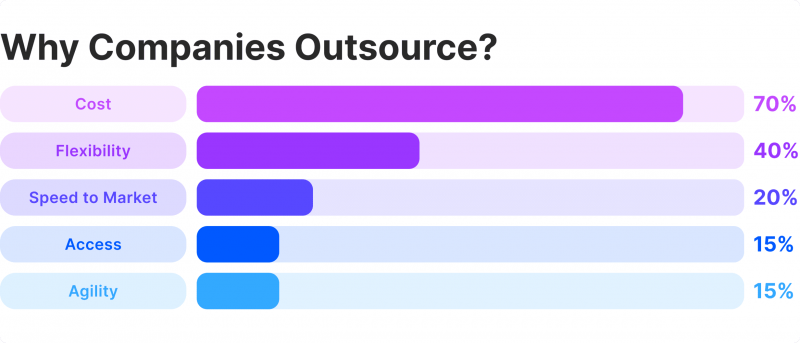
Customisation Freedom
You can request and deploy various customisation capabilities. However, integrating and developing those services falls on the provider, which can take time based on the outsourcing service.
However, miscommunication might occur due to the geographical distance between you and the provider, and numerous back-and-forth enhancements may be required before you get the desired features.
Software Outsourcing Ownership
Outsourcing services usually entail operating under the provider’s name. However, launching your business under your name and rebranding the solution with your business name and logo might involve a premium price that some startups and projects with limited budgets cannot afford.
Therefore, if you plan to operate under your own brand specifications, make sure you agree to these terms before outsourcing your platform web development to avoid paying additional fees.
However, some providers give you the choice not to keep the outsourced development team after launching your platform. Alternatively, you can switch to your in-house team after the solution has been prepared and launched to minimise maintenance costs.
Custom Development: More Customisation and Control
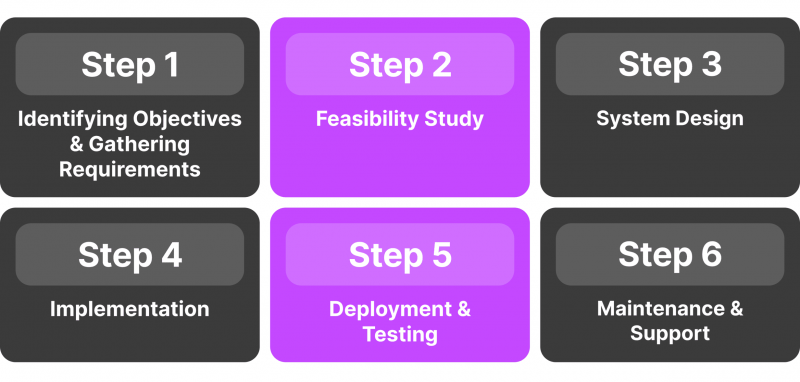
Custom software development means building the entire trading platform from scratch using programming languages and software development tools. This includes writing codes, designing layouts, embedding functionalities and developing the structure from the ground up.
Custom platform development involves long planning, developing, testing, and deploying stages. It allows managers to build the platform according to their preferences and eliminates the need to outsource or rely on external entities for maintenance or development.
This approach requires advanced technical skills, making it exclusively beneficial for experienced software developers.
Challenges of In-House Software Development | B2BROKER at FMLS 2023
Check out the speech of our CEO and Founder, Arthur Azizov, as he concluded B2Broker’s participation in the prestigious FMLS with valuable nuggets about software development challenges. Arthur started his speech by showcasing the changes in the software landscape, from having full-stack developers to dedicated front-end and back-end developers, as a response to the vast updates in the industry. Arthur discussed 8 challenges software development companies face today, including product design, testing, cloud infrastructure, team synchronisation practices, and many more you can find by watching this 30-minute speech.
How Much Does Custom Development Cost
Custom software development can be costly due to the extensive process and labour hours involved. If you are building a company from scratch, you must find, recruit, train, and maintain an experienced developer team.
Moreover, skilled programmers and professionals earn relatively higher salaries on the payroll, requiring significant investment and operational capital to begin with.
Additionally, you must afford the supportive system to build your platform, including a programming framework, testing environment, cloud hosting infrastructure, and technical auditing. These can add extra payments to your budget.
Custom Software Development Speed
The development stage can extend or shrink based on the complexity of your brokerage platform and the required functionalities. However, the deployment can extend massively if architecture failures, structural errors, or code line bugs appear.
These instances can hinder the launch, as it usually takes considerable time to investigate, find and resolve these technical shortcomings.
Is Custom Software Development Safer?
Security in building custom software varies broadly. You can enjoy maximum flexibility in implementing security practices and safety measures while hand-making the platform.
However, if your team lacks the experience or the testing phase is not done diligently, you can expose your software to severe risks. Therefore, it is better to double-inspect or delegate the security auditing to a specialised entity, although it may require additional fees.
Custom Development Integration and Flexibility
The main advantage of building the trading system with in-house teams is that you can dictate your own terms and practice maximum customisation freedom. You can add and personalise the features, functionalities, and additional tools without paying third-party service providers.
Nevertheless, you will be required to pay to integrate specialised services that suit your customers, such as crypto payment gateways, e-mail services, and blockchain plug-ins, which you can afford to program internally.
Another advantage of custom software development is that your teams already have the entire backlog and system flow and can seamlessly deploy any service improvements, adjustments, or updates.
Managing Custom Development Software
The custom-made software is entirely yours. You can claim ownership of it, brand it, and design it.
However, if you intend to rebrand your business, you must dedicate significant resources and time to planning, implementing, and deploying new interfaces and functionalities.
Moreover, you must bear maintenance and server management responsibilities, which can be challenging and costly. These expenses can accelerate if you want to offer STP or ECN facilities while offering high-frequency trading, which requires significant investment to provide ultra-fast connectivity.
Source Code: How Does it Work
Source code development entails buying the development environment of an existing website or platform, including code lines and functions, and redesigning them to build a brokerage platform or application.
This approach requires advanced technological and programming skills because you must identify if the source code can be reiterated and written according to your needs.
Development companies offer source code licensing, allowing you to own a software source code during the license’s contract period. Alternatively, you can purchase the entire system’s back-end code and re-work it to create your platform or build a supportive tool.
How Much Does it Cost to Start Source Code Development?
The costs of finding, checking and rewriting a source code are high. You need an experienced development team to perform these tasks for an extended period, which can incur more expenses on your balance sheet.
Discover the Tools That Power 500+ Brokerages
Explore our complete ecosystem — from liquidity to CRM to trading infrastructure.
The time and cost of writing source code depend on the project’s complexity. The more features and functionalities you want to add, the larger the project becomes and the more expensive it gets.
Source Code Development Speed
Developing existing code to build a brokerage platform depends on the complexity of the source code and your website’s design. The software development phase is usually long and involves checking the source code, planning your platform’s design, writing codes, and conducting QA tests.
Any shortcomings in the development process can hinder the deployment phase, causing significant delays and possibly postponing your project.
Is Source Code a Secure Option?
The cybersecurity of a source code depends on the previous developer’s practices, programming language and use. You must ensure that the code does not have bugs and errors that require additional time to resolve.
However, once you own the code, you can rewrite it and secure it according to your preferences and team experiences.
Customisation Freedom in Source Code Development
Your purchase code allows you maximum freedom and flexibility. However, your developing team’s capabilities will determine whether you can integrate more tools and customise features.
The rewriting process is long and extensive, and adding more requirements for customisation tools or integrations can extend the work pipeline. However, if your team has sufficient capacity, you can highly customise your platform and offer your client personalised services.
Source Code Management and Risks
Managing a purchased source code depends on the inherited complexity and environment. If the code contains multiple bugs and shortcomings, it can be challenging to develop your brokerage platform. Therefore, it is crucial to carefully inspect the original code before buying it to avoid potential drawbacks and obstacles.
White Label vs Outsourcing vs Custom Development vs Source Code: Which One is Better
Each approach has advantages and disadvantages, and deciding which suits your business depends on your needs and capabilities.
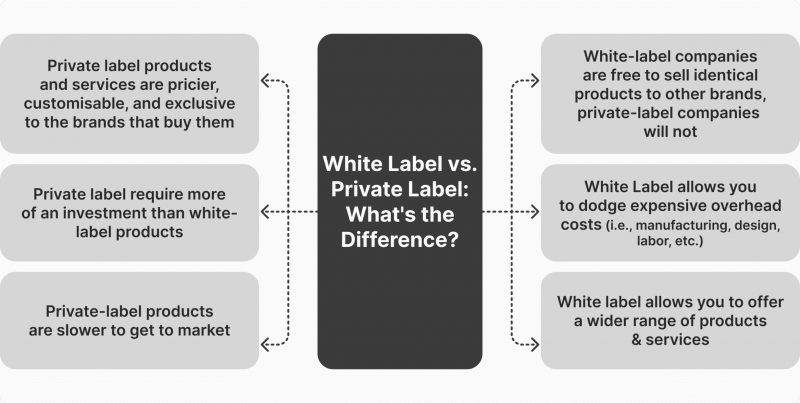
Partnering with a white label company is the best way to cut time and costs. It allows you to enter the market very quickly and integrate various customisation tools that enable you to offer personalised services.
Outsourcing is better if you are looking to cut costs and lack technical experience, where you can delegate the entire development process to a third-party company with the risk of possible delays and lack of control.
Custom software and source code development require exceptional programming skills to build the website from scratch, including prolonged planning, code-writing and auditing stages. However, hand-making your platform gives you maximum customisation freedom.
Conclusion
There are different ways to enter and compete in the financial market, and determining your approach depends on your experience, team capacity, time and budget.
When deciding white label vs outsourcing vs custom development, vs source code, it is crucial to consider the costs and skills required to build your platform, the deployment time to enter the market and the customisation freedom you can enjoy.
FAQ
Is white label better than outsourcing?
Getting a white label brokerage solution gives you more control over your platform and development phase while outsourcing suits companies that lack technical skills by delegating the whole process to a third party.
Is white label expensive?
Acquiring a white label involves a one-time payment to own the license, as well as recurring maintenance and hosting fees. However, these costs are less than developing an entire platform from scratch, and this way, you can save time and enter the market much faster.
Is a white label better than a custom label?
Custom labelling entails building an entire solution from the ground up, involving prolonged planning, developing, testing, and deployment stages. On the other hand, white labelling involves getting a ready-to-use platform that you can quickly deploy and start working with.
How much does a white label cost?
The cost of the white label depends on the desired platform’s complexity and required features and functionalities, which are estimated to range between $10,000 and $50,000.


